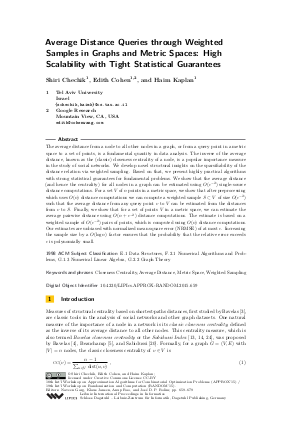Average Distance Queries through Weighted Samples in Graphs and Metric Spaces: High Scalability with Tight Statistical Guarantees
Authors Shiri Chechik, Edith Cohen, Haim Kaplan
-
Part of:
Volume:
Approximation, Randomization, and Combinatorial Optimization. Algorithms and Techniques (APPROX/RANDOM 2015)
Part of: Series: Leibniz International Proceedings in Informatics (LIPIcs)
Part of: Conference: International Conference on Randomization and Computation (RANDOM)
Part of: Conference: International Conference on Approximation Algorithms for Combinatorial Optimization Problems (APPROX) - License:
 Creative Commons Attribution 3.0 Unported license
Creative Commons Attribution 3.0 Unported license
- Publication Date: 2015-08-13
File

PDF
LIPIcs.APPROX-RANDOM.2015.659.pdf
- Filesize: 0.56 MB
- 21 pages
Document Identifiers
Subject Classification
Keywords
- Closeness Centrality; Average Distance; Metric Space; Weighted Sampling
Metrics
- Access Statistics
-
Total Accesses (updated on a weekly basis)
0PDF Downloads0Metadata Views
Abstract
The average distance from a node to all other nodes in a graph, or from a query point in a metric space to a set of points, is a fundamental quantity in data analysis. The inverse of the average distance, known as the (classic) closeness centrality of a node, is a popular importance measure in the study of social networks. We develop novel structural insights on the sparsifiability of the distance relation via weighted sampling. Based on that, we present highly practical algorithms with strong statistical guarantees for fundamental problems. We show that the average distance (and hence the centrality) for all nodes in a graph can be estimated using O(epsilon^{-2}) single-source distance computations. For a set V of n points in a metric space, we show that after preprocessing which uses O(n) distance computations we can compute a weighted sample S subset of V of size O(epsilon^{-2}) such that the average distance from any query point v to V can be estimated from the distances from v to S. Finally, we show that for a set of points V in a metric space, we can estimate the average pairwise distance using O(n+epsilon^{-2}) distance computations. The estimate is based on a weighted sample of O(epsilon^{-2}) pairs of points, which is computed using O(n) distance computations. Our estimates are unbiased with normalized mean square error (NRMSE) of at most epsilon. Increasing the sample size by a O(log(n)) factor ensures that the probability that the relative error exceeds epsilon is polynomially small.
Cite As Get BibTex
Shiri Chechik, Edith Cohen, and Haim Kaplan. Average Distance Queries through Weighted Samples in Graphs and Metric Spaces: High Scalability with Tight Statistical Guarantees. In Approximation, Randomization, and Combinatorial Optimization. Algorithms and Techniques (APPROX/RANDOM 2015). Leibniz International Proceedings in Informatics (LIPIcs), Volume 40, pp. 659-679, Schloss Dagstuhl – Leibniz-Zentrum für Informatik (2015)
https://doi.org/10.4230/LIPIcs.APPROX-RANDOM.2015.659
BibTex
@InProceedings{chechik_et_al:LIPIcs.APPROX-RANDOM.2015.659,
author = {Chechik, Shiri and Cohen, Edith and Kaplan, Haim},
title = {{Average Distance Queries through Weighted Samples in Graphs and Metric Spaces: High Scalability with Tight Statistical Guarantees}},
booktitle = {Approximation, Randomization, and Combinatorial Optimization. Algorithms and Techniques (APPROX/RANDOM 2015)},
pages = {659--679},
series = {Leibniz International Proceedings in Informatics (LIPIcs)},
ISBN = {978-3-939897-89-7},
ISSN = {1868-8969},
year = {2015},
volume = {40},
editor = {Garg, Naveen and Jansen, Klaus and Rao, Anup and Rolim, Jos\'{e} D. P.},
publisher = {Schloss Dagstuhl -- Leibniz-Zentrum f{\"u}r Informatik},
address = {Dagstuhl, Germany},
URL = {https://drops.dagstuhl.de/entities/document/10.4230/LIPIcs.APPROX-RANDOM.2015.659},
URN = {urn:nbn:de:0030-drops-53291},
doi = {10.4230/LIPIcs.APPROX-RANDOM.2015.659},
annote = {Keywords: Closeness Centrality; Average Distance; Metric Space; Weighted Sampling}
}
Author Details
References
-
A. Abboud, F. Grandoni, and V. Vassilevska Williams. Subcubic equivalences between graph centrality problems, APSP and diameter. In SODA. ACM-SIAM, 2015.

-
K. Barhum, O. Goldreich, and A. Shraibman. On approximating the average distance between points. In Approximation, Randomization, and Combinatorial Optimization. Algorithms and Techniques, volume 4627 of Lecture Notes in Computer Science. Springer, 2007.

-
A. Bavelas. A mathematical model for small group structures. Human Organization, 7:16-30, 1948.

-
A. Bavelas. Communication patterns in task oriented groups. Journal of the Acoustical Society of America, 22:271-282, 1950.

-
M. A. Beauchamp. An improved index of centrality. Behavioral Science, 10:161-163, 1965.

-
E. Cohen, D. Delling, T. Pajor, and R. F. Werneck. Computing classic closeness centrality, at scale. In COSN. ACM, 2014.

-
E. Cohen, D. Delling, T. Pajor, and R. F. Werneck. Sketch-based influence maximization and computation: Scaling up with guarantees. In CIKM, 2014.

-
E. Cohen, N. Duffield, C. Lund, M. Thorup, and H. Kaplan. Efficient stream sampling for variance-optimal estimation of subset sums. SIAM J. Comput., 40(5), 2011.

-
M. B. Cohen and R. Peng. 𝓁_p row sampling by lewis weights. In STOC. ACM, 2015.

-
T. M. Cover and P. E. Hart. Nearest neighbor pattern classification. IEEE Transactions on Information Theory, 13(1):21-27, 1967.

-
D. Eppstein and J. Wang. Fast approximation of centrality. In SODA, pages 228-229, 2001.

-
M. Fredman and R. E. Tarjan. Fibonacci heaps and their uses in improved network optimization algorithms. Journal of the ACM, 34(3):596-615, 1987.

-
L. C. Freeman. A set of measures of centrality based on betweeness. Sociometry, 40:35-41, 1977.

-
L. C. Freeman. Centrality in social networks: Conceptual clarification. Social Networks, 1, 1979.

-
O. Goldreich and D. Ron. Approximating average parameters of graphs. Random Struct. Algorithms, 32(4):473-493, 2008.

-
J. Hamidzadeh, R. Monsefi, and H. S. Yazdi. DDC: distance-based decision classifier. Neural Computing and Applications, 21(7), 2012.

-
P. Indyk. Sublinear time algorithms for metric space problems. In STOC. ACM, 1999.

-
P. Indyk. High-dimensional Computational Geometry. PhD thesis, Stanford University, 2000.

-
K. Okamoto, W. Chen, and X. Li. Ranking of closeness centrality for large-scale social networks. In Proc. 2nd Annual International Workshop on Frontiers in Algorithmics, FAW. Springer-Verlag, 2008.

-
G. Sabidussi. The centrality index of a graph. Psychometrika, 31(4):581-603, 1966.

-
M. Talagrand. Embedding subspaces of l₁ into lⁿ₁. Proc. of the American Math. Society, 108(2):363-369, 1990.

-
M. Thorup. Quick k-median, k-center, and facility location for sparse graphs. SIAM J. Comput., 34(2):405-432, 2004.

-
V. Vassilevska Williams and R. Williams. Subcubic equivalences between path, matrix and triangle problems. In FOCS. IEEE, 2010.

-
S. Wasserman and K. Faust, editors. Social Network Analysis: Methods and Applications. Cambridge University Press, 1994.

